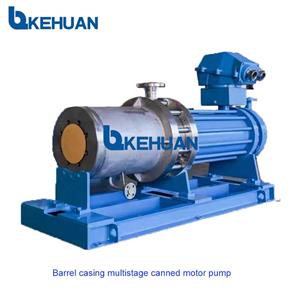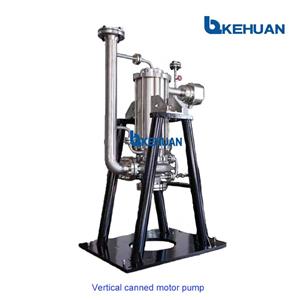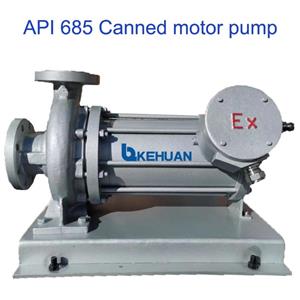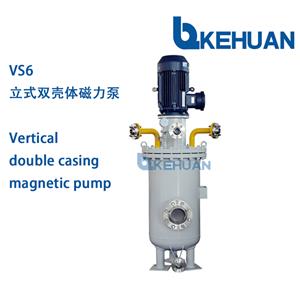The Advantages of Sealless Magnetic Drive Pumps
Sealless magnetic drive pumps and the biodiesel industry share an important common denominator—a safer, cleaner environment. By eliminating the rotating mechanical seal of traditional centrifugal pumps, sealless magnetic drive pumps eliminate the possibility of fluid leaks and for potentially harmful chemicals to escape. There is a host of other compelling reasons to consider the use of centrifugal sealless magnetic drive pumps in the biodiesel production process. Technology developments, years of application experience and an ever-widening acceptance of the equipment has resulted in a reliable, cost-effective application. Sealless magnetic drive pumps offer advantages for a number of the toughest, hard-to-seal chemical applications in the biodiesel production process.
Historically, sealless pumps have been used to avoid fugitive emissions and provide a safety element in the handling of volatile or hazardous chemicals. Paramount to the sealless design is that no dynamic shaft seal is required to contain the pumped fluid. Rather, a stationary containment shell is used to isolate the pumpage from the ambient environment. This is possible because power is transmitted across the stationary shell through magnetic lines of flux, which induce rotation of the impeller shaft. Thus, sealless magnetic drive pumps are able to avoid the normal leakage that is a fundamental byproduct of any mechanical face seal.
Because these pumps operate "emission free," they have been excluded from the fugitive monitoring requirements of the Clean Air Act as it applies to pumps handling volatile and hazardous air pollutants. This makes them an ideal choice for regulated services like methanol and hydrochloric acid. In fact, sealless pumps can be used anywhere that American National Standards Institute (ANSI) sealed pumps with double-seals or explosion-proof motors are in place.
Reliability, Low Maintenance A number of operational benefits go hand-in-hand with the use of sealless pumps. Many users find that sealless pumps are more reliable than sealed units. Numerous studies show that shaft seals are the principal cause of failure in chemical process pumps. One such study of more than 1,250 operating pumps (and more than 2,500 installed pumps), showed that approximately 50 percent of the primary-failure causes were the result of leaking seals. In another study, a major chemical manufacturer concluded that its pump repairs were 30 percent to 60 percent less costly or less frequent with magnetic drive pump designs than with chemical-duty pumps featuring multiple seals.
Not only are the pumps more reliable, but the overall lifecycle cost is reduced when maintenance costs are factored. Many users have cited low maintenance as the one component that swayed a decision toward the sealless offering.
When to Use a Sealless Pump
An evaluation of the pumped liquid is the first major decision point in considering the use of a sealless pump. For example, volatile fluids have vapor pressure characteristics that result in a change from a liquid to vapor state at atmospheric pressure.
Even when working properly, mechanical seals can be a source of fugitive emissions when volatile liquids are involved. Of course, volatility is not the only criterion for assessing the viability of sealless pumps. Toxicity, flammability and corrosiveness must also be considered. In addition, extreme temperature service and liquids that are sensitive to changes in temperature are good candidates for sealless pumps. This includes liquids that have low melting or freezing points (as with many acids), and liquids that experience crystallization during temperature changes or when in contact with air (e.g., caustics).
Crystallization can occur as the liquid leaks across a conventional seal face or when air is drawn into the pump. Typical sealless pump services cover a broad range of fluids that include acids, alkalis, salts, esters, hydrocarbons, monomers, polymers, alcohols, ethers, halogens, nitrogen or sulfur compounds and even some extreme water conditions. In biodiesel production, there are a number of applicable duties. On the front-end of the process, where the feedstocks are pretreated and refined, sealless pumps handle hot oils and fatty acids, and are ideal in deodorizer service.
Improved Safety
In the biodiesel-making process, methanol (CH3OH) is used in a 1:10 ratio with the feedstock oil and a catalyst. Methanol is flammable, explosive and presents known health risks. Methanol flames are almost invisible, presenting the risk of plant personnel unknowingly walking into an active methanol fire. Sodium methylate (NaOCH3, also known as sodium methoxide), the most commonly used catalyst in commercial biodiesel production, is flammable, explosive, and corrosive to eyes, skin and the respiratory tract. It is potentially lethal if inhaled or ingested in amounts as low as 30 milliliters. A 25 percent sodium methylate solution is also highly hygroscopic and may react violently in contact with water. It is imperative that the product does not come into contact with air or water. Reaction of sodium methylate with moisture or solvents emits heat, which presents an additional fire hazard. Alternative catalysts used in biodiesel—namely sodium hydroxide (NaOH) or potassium hydroxide (KOH)—crystallize in the presence of air and can be difficult to seal. Because of that tendency, these services also lend themselves well to sealless pumps.
On the back-end of the process, the crude glycerin generated in the transesterification reaction is recovered and goes through a neutralization step. The glycerin contains unused catalyst and soaps that are neutralized with an acid —generally sulfuric acid or hydrochloric acid—and sent to storage as crude glycerin. From there, upgrading to high-purity or pharmaceutical-grade glycerin also requires the addition of an acid such as hydrochloric acid. These corrosive services generally demand the use of higher alloy metallurgies. Non-metallic magnetic drive pumps provide an ideal cost-effective, sealless solution for these services.
Green Solutions for a Growing Industry Sealless centrifugal pumps are a valuable asset in the arsenal of today’s biodiesel production plants. The fact that they completely eliminate leaks complements increasingly strict environmental and safety objectives. This also aligns well with the “green” reputation that biodiesel already enjoys. In addition, the added reliability sealless magnetic drive pumps offer can improve and enhance the biodiesel production process. The pumps should not only be considered for new installations, since numerous conversion opportunities exist for the retrofit of existing, poorly performing pumps. Standard ANSI dimensions facilitate this process and make it a cost-effective alternative.
There will continue to be a need for mechanically sealed pumps that operate outside of the hydraulic capabilities of sealless equipment. However, inside that performance envelope, there are numerous motivations, including reduced environmental impact, improved safety and reliability, to encourage sealless technology.




